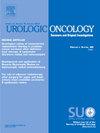GENE EXPRESSION DIFFERENCES AND PATHWAY ACTIVATION BY RACE IN ERG+ PROSTATE CANCERS: IMPLICATIONS FOR EQUITABLE CANCER CARE
IF 2.4
3区 医学
Q3 ONCOLOGY
Urologic Oncology-seminars and Original Investigations
Pub Date : 2025-03-01
DOI:10.1016/j.urolonc.2024.12.015
引用次数: 0
Abstract
Introduction
A large body of evidence has demonstrated increased prostate cancer (PCa) incidence and mortality in African-American (AA) men relative to White men. While outcome disparities are strongly influenced by social determinants of health, established differences in molecular tumor biology between AA and White men have implications across the spectrum of prostate cancer care, including early diagnostic testing and targeted therapeutics. Expression of the ERG gene (ERG+) is an early molecular alteration in one-half of prostate cancers. Additionally, ERG+ is found to be two-fold more prevalent in White men compared to AA men. However, downstream molecular differences by race remain poorly understood. In a diverse cohort of men with ERG+ prostate cancer, we sought to assess differential expression of PCa-associated genes and identify specific biologic pathways implicated in AA PCa.
Methods
Using the publicly available GSE169038 dataset, we analyzed Decipher whole-transcriptome expression profiles (22,236 transcripts) in 1079 men with clinically significant PCa (Grade Group ≥ 2) who underwent radical prostatectomy. Tumors were designated as either ERG+ or ERG- via Gaussian Mixture Modeling, and differentially expressed genes were identified among sample groups using the linear models for microarray data (Limma) package with a false discovery rate (FDR) threshold of 5%. Gene Set Enrichment Analysis (GSEA) was performed on differentially expressed genes using the EnrichR web-based tool with an FDR threshold of 10%. Correction for multiple comparisons was performed using the Benjamini-Hochberg method.
Results
The microarray analysis included 522 White and 557 AA men. Overall, 40% (n=209) of White patients were classified as ERG+, as compared to 23% (n=127) of AA patients (p<0.001). A total of 5814 genes were differentially expressed in ERG+ tumors relative to ERG- tumors. Of these, 2605 (45%) genes were differentially expressed in both White and AA patients. Additionally, 1987 (34%) genes were differentially expressed in only White patients, and 1312 (23%) were differentially expressed in only AA patients. Enrichment signatures in the genes that were differentially expressed in both White and AA patients demonstrated significant associations with pathways related to androgen and estrogen response, fatty acid metabolism, and apoptosis (q<0.05 for all). In addition to the above shared pathways, genes differentially expressed only in White patients were associated with the p53 (q=0.04), while genes differentially expressed solely in AA patients were associated with the E2F Target pathway (q=0.07).
Conclusions
Our analysis revealed distinct genetic profiles between White and AA patients within the ERG+ PCa molecular subtype. As previously described, we found ERG upregulation was associated with dysregulation of the androgen receptor pathway in both White and AA patients. However, we additionally identified race-specific disruptions to the E2F-RB in AA and p53 cell cycle regulation axis. As molecular testing continues to emerge as a standard component of cancer detection and treatment selection, a clear understanding of race-associated tumor differences will be necessary to ensure equitable care across racially diverse settings.
求助全文
约1分钟内获得全文
求助全文
来源期刊
CiteScore
4.80
自引率
3.70%
发文量
297
审稿时长
7.6 weeks
期刊介绍:
Urologic Oncology: Seminars and Original Investigations is the official journal of the Society of Urologic Oncology. The journal publishes practical, timely, and relevant clinical and basic science research articles which address any aspect of urologic oncology. Each issue comprises original research, news and topics, survey articles providing short commentaries on other important articles in the urologic oncology literature, and reviews including an in-depth Seminar examining a specific clinical dilemma. The journal periodically publishes supplement issues devoted to areas of current interest to the urologic oncology community. Articles published are of interest to researchers and the clinicians involved in the practice of urologic oncology including urologists, oncologists, and radiologists.

 求助内容:
求助内容: 应助结果提醒方式:
应助结果提醒方式:


